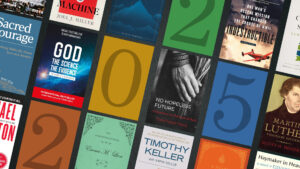Some of my earliest memories are of my dad, a fly fisherman, carefully selecting tiny bits of feather and horsehair for his fly box. He knew the importance of carrying a colorful and varied selection of flies: Once on the river, he would identify the newly hatched insects on the stream’s surface and notice which were attracting the fish. He could then “match the hatch” from his box, tying onto his line a fly that resembled the real ones on the water.
In the Christian life, too, we should “match the hatch.” The commands “Rejoice with those who rejoice, weep with those who weep” (Rom. 12:15) and “Bear one another’s burdens” (Gal. 6:2) are exhortations to sympathy—to joining in others’ sufferings and blessings.
These commands call us to look at our brothers and sisters and then reach for work gloves, put on sackcloth, or iron our finest party clothes. They call us to dress our hearts to match the people around us.
And one of the best ways we can match the hearts of others is by praying with them. Is your brother joyful? Give thanks alongside him. Is your sister grieving? Express sorrow with her. Does someone have a need? Make it your concern too.
Loving the Hurt and the Happy
We do this most obviously when others are experiencing trials (or joys) we ourselves have experienced. When my husband and I suffered a miscarriage, other couples who’d also lost children prayed for us. Men and women sympathized with us at the church prayer meeting—asking God to tenderly care for us in our grief just as he had tenderly cared for them in theirs.
And then a year later when we celebrated the birth of our son, the same couples rejoiced with us—praising God for his kind provision of a baby just as he had also given children to many of them.

This is what Christ does for us. The God who became man always makes intercession for us (Heb. 7:25). The Savior who “has borne our griefs and carried our sorrows” (Isa. 53:4) sympathizes with us (Heb. 4:15). The Shepherd who celebrates with his friends when one sheep is restored (Luke 15:3–7) will rejoice with us as we pray.
Loving the Burdened and the Blessed
But we also sympathize with others in prayer when we notice they don’t have the blessings we do. We who are strong lend a hand to the weak—helping them to cast their burden on the Lord in prayer. In this way, the employed pray for the unemployed, the married for the widowed, the mature for the new believers, the healthy for the sick, and those at liberty for those in chains.
A handbook for church members from 1835 quaintly described the unifying blessings of a church prayer meeting this way:
[The prayer meeting] tends to keep alive the spirit of devotion; demonstrates, by the prayers of so many brethren who engage, the minor varieties, yet prevailing uniformity, of Christian experience; humbles the rich by the holy gifts and graces of the poor; encourages the poor by the sympathies, confessions, and acknowledgements of the rich; cheers the heart of the minister by the kind interest and fervent supplications of his flock; cements the minds of the members; and may be supposed to bring down the blessings of God upon the church.
The final way we bear one another’s burdens in prayer is perhaps the most radical of all: We sympathize with others when we pray for them to have blessings we ourselves haven’t enjoyed. In discussing the 10th commandment, the Westminster Larger Catechism explains we have a biblical duty to “further all that good which is [our neighbor’s].”
Has the Lord given your brother good health? Pray for it to continue. Has he given your sister a job that uses her gifts and provides for her financial needs? Pray she would have it for years to come. Has he blessed other church members with loving marriages, obedient children, opportunities for ministry, and abundant friendships? Pray for those blessings to be multiplied even further.
This is self-denying love. Brothers and sisters, let us love one another by prayer.
Editors’ note: Megan Hill is the author of Praying Together: The Priority and Privilege of Prayer in Our Homes, Communities, and Churches (Crossway, 2016). She will be leading “Walking with Others in Prayer” at the 2017 Bethlehem Conference for Pastors and Church Leaders, January 30 to February 1.
Download your free Christmas playlist by TGC editor Brett McCracken!
 It’s that time of year, when the world falls in love—with Christmas music! If you’re ready to immerse yourself in the sounds of the season, we’ve got a brand-new playlist for you. The Gospel Coalition’s free 2025 Christmas playlist is full of joyful, festive, and nostalgic songs to help you celebrate the sweetness of this sacred season.
It’s that time of year, when the world falls in love—with Christmas music! If you’re ready to immerse yourself in the sounds of the season, we’ve got a brand-new playlist for you. The Gospel Coalition’s free 2025 Christmas playlist is full of joyful, festive, and nostalgic songs to help you celebrate the sweetness of this sacred season.
The 75 songs on this playlist are all recordings from at least 20 years ago—most of them from further back in the 1950s and 1960s. Each song has been thoughtfully selected by TGC Arts & Culture Editor Brett McCracken to cultivate a fun but meaningful mix of vintage Christmas vibes.
To start listening to this free resource, simply click below to receive your link to the private playlist on Spotify or Apple Music.


































